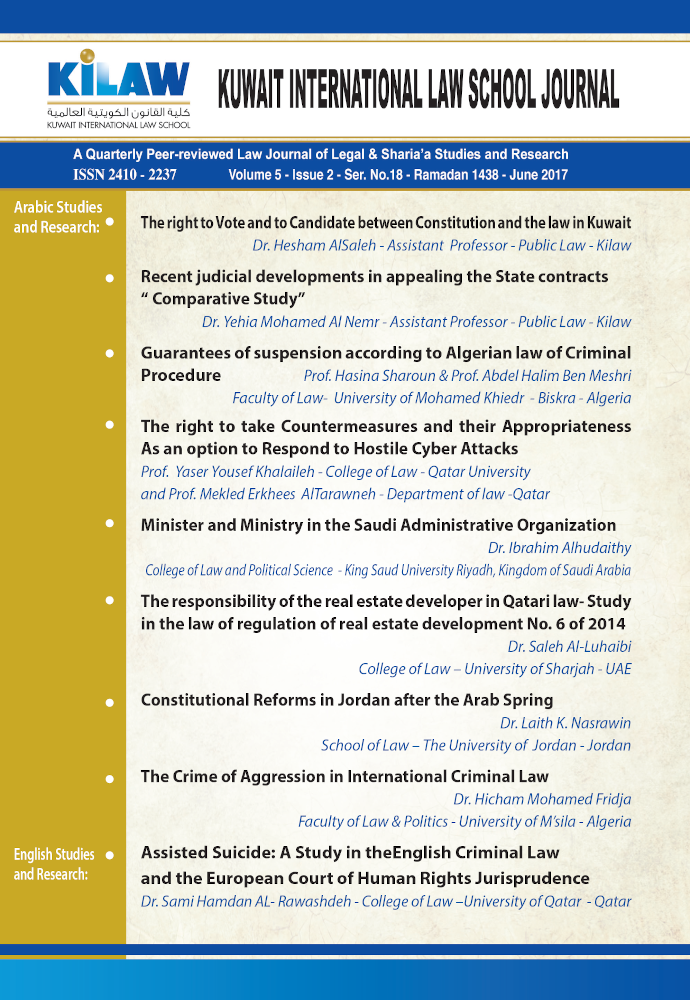Chief-in-Editor Prof. Badria A. Al-Awadi
Judiciary is an important element of achieving justice and building stable societies. Therefore, divine religions and positive laws were keen to give it great importance, as constitutional documents bestowed a high position upon it, equaling it to the executive or legislature authorities, and granted it an independent status and necessary tools, which would ensure achieving the tasks assigned to it. Judiciary’s status has become well established and its important has increased since it has become highly respected along with its affective role as an international approach and one of the main criteria in counties development and advancement as it is considered the force through which laws are enforced and justice is achieved in various conflicts and disputes. It also serves as a protector of rights and freedoms, and a neutral party in dispute settlements that may occur between the legislative and executive authorities. Arabic countries have taken this approach at the level of constitutional and legal documents and texts. However, the role and affect of the judiciary authority have varied according to different circumstances of each one of them when facing converging challenges towards improving the performance of the judiciary in a positive and effective direction. This would be reflected on other social sectors and areas, and would contribute in the development and enhancement of laws through innovative jurisprudence, supported by a sustained movement for specialists in jurisprudence in various areas, in addition to legal legislations taking into account the requirements of government and administrative functions.
The successive comparative international realities highlight the positive and effective roles played by the judiciary authority in the field of developing and strengthening the stability of the legal system and its authority. Starting from the jurisprudence of the French courts regarding obligations, contracts and administration which have been implemented over years and decades and have filled a acute shortage in vital areas in the field of business, contracts, international trade and freedoms, which the French legislature had assimilated in hundreds of legal articles that were included in broader legislative reform in the history of the Republic as published in the official newspapers in February last year, through South Korea’s Constitutional Court decisions which ruled to isolate the President from her post after condemnation by Parliament in a corruption case and voted to isolate her, in a landmark ruling through which an elected President is isolated, due to the “acts of President Park which have ruined the spirit of democracy and law in the country,” by “breaking the law when she allowed Choi Soon-sil (her friend) to intervene in the Affairs of the country, in addition to breaking the confidentiality rules by leaking important presidential documents.” The judicial ruling ended a political crisis in the country, after which new presidential elections were conducted, and the isolated President’s case was referred to the judiciary authority to take its ruling in the corruption case.
Among these influential international realities reflecting the crucial role of the judiciary is the Supreme Court’s decision in Britain dated 4th November 2016 to oblige the government to obtain the approval of the House of Commons before holding any negotiations with the European Union about exiting it. It has pointed at the unconstitutionality of holding such negotiations without obtaining the approval, and it has rejected the Government’s argument that it could use executive powers known as “Royal Prerogative” to use Article 50 of the EU’s Lisbon Treaty and initiate discussion on withdrawing from the Union. Under this provision, the Government presented the details of this withdrawal to the Parliament to vote before initiating the negotiation process with the European Union, which has been performed later as an implementation of the Court’s ruling.
The previously compared facts provide evidence of the positive role the judiciary can effectively play, both in the development of laws and solutions through jurisprudence, solving crises, maintaining the authority of constitutional principles and respecting rights and freedoms. The differing environments and general conditions that preclude considering developing the role and effectiveness of the judicial authority in various Arabic countries. There are basic requirements that shall be reviewed and considered in regards to the position of the judiciary in some countries, as the completion of nationalizing judicial positions shall be accelerated, and working on strengthening the structure of the theoretical and practical aspects, which would lead to a good enforcement of law and jurisprudence to ensure that the implementation of the rule of law and justice. It is also important to strengthen the guarantees of judicial independence, whether substantively or organizationally, which is the responsibility of the executive and legislative authorities.
We would also like to congratulate our readers, fellow researches and faculty members with the month of Ramadan, praying to Allah Almighty to accept our prayers and deeds and lead us towards goodness, appositeness and righteousness, to preserve our faith and unity and protect our Muslim nation against its enemies, For God Hath power over all things.

